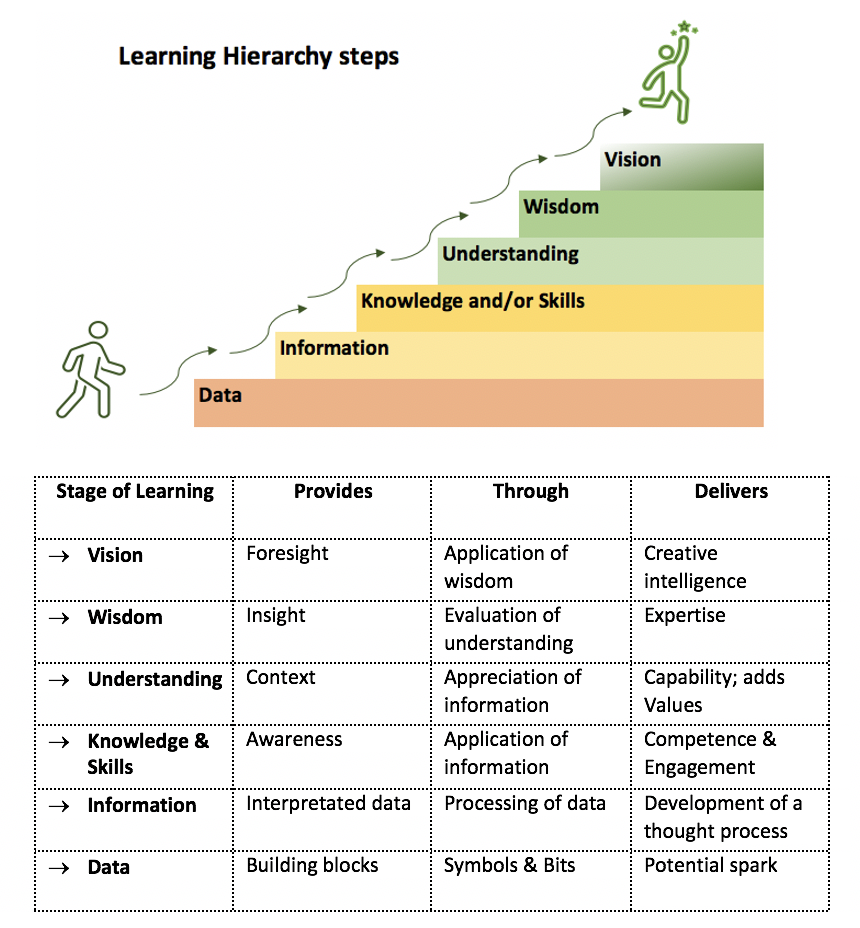Learning Hierarchy 

The stages of learning are often represented as a knowledge, or learning, hierarchy, with knowledge and understanding typically being wrapped up within the term 'knowledge' in many examples.
However, there can be a clear distinction between knowledge and understanding, whereby a learner has an appreciation of information within a particular context (i.e. understanding), rather than just having an awareness of the information which they can apply in an everyday situation (i.e. knowledge and skills).
An analogy could be that someone might know about a lot of information, or actually they are aware of where they can find that information, primarily on the World Wide Web, (this would be 'shallow' knowledge) but are unable to fully appreciate the depth of meaning of that information (which would be understanding, or alternatively 'depth' of knowledge).

If you have listened to and read media related to grounds care over the past 5-years, and more, it makes it clear that there is a distinct difference between knowledge and understanding. One must not be frightened of appreciating the situation but all too often it is convenient to ignore the difference between these two terms and being afraid to upset those who have expressed some knowledge in an industry trade article or tweet for example. By carrying on regardless this approach has been reaping distinctly worrying outcomes.
The stages of learning are often represented as a hierarchy, such as the DIKW Pyramid, or an extended categorisation which can be seen in the Learning Hierarchy shown above. However, knowledge and understanding are typically wrapped up within the term 'knowledge' in many cases and this has not served the grounds care industry well.
Five-years ago a report 'What's in store for horticulture in 2017?' identified the loss of staff specialism and professionalism within local authority parks departments and a shortage of skilled and trained turf operatives as major concerns for the coming year.( 13 January 2017, by HW team, HortWeek).
This situation and trend have actually been a concern for many years and the roots of the problem can be, partially if not and significantly, laid at the doors of the lack of the political vision in the late 1980s and 1990s with Compulsory Competitive Tendering and subsequent Best Value requirements that were introduced for local authorities.
Within the grounds care industry there is certainly a lot of knowledge, the enthusiasm of volunteers and employees is legendary and the sharing of the results of working practices via Twitter is significant in helping promote this knowledge.
The question which arises though is, 'Does knowledge translate into an understanding and appreciation of the 'why' for the different activities?' This distinction and separate stage help to provide the wrapper for knowledge and when fully embraced and understood only then helps to deliver a grounds person who can be classed as capable, in contrast to competent, in their work.
Competence is gained through practice within controlled and expected conditions, basically repetition, as for example would occur when an individual is undertaking an apprenticeship which judges the competence of an individual.
Capability, by contrast, enhances this so that an individual is able to adapt and respond to unexpected situations that have not been routinely practiced and checked before, having a greater depth of understanding why a variation or change is required for the arisen situation and being able to fully explain the reasoning behind this adaptation.
Progressing from competence to capability is something which is developed and honed over time, so an individual who successfully achieves the required basic benchmark of competence will need to continue learning, questioning and challenging, otherwise they will stagnate and essentially fall back to the knowledge (and skills) stage of the learning hierarchy.
Greater emphasis must be given within the grounds care industry to encourage and facilitate progression through the learning hierarchy so as to better prepare individuals for changes in technology and working practices, as well as to entice others into the industry by showcasing the wealth of learning opportunities available and not a message of being trained or educated to a minimum level 'to get the job done' for the employer, as is arguably the case in many situations, as this will project a negative and backward looking image of some employers who are representing the wider industry.
The message (or maybe moral of the message) being that do not rest on your laurels once you have achieved a certain stage. Understanding is developed from Level 2 through to Level 3, and then higher advanced technical and management level education and training. Wisdom and ultimately 'Vision' will, or can, arise following many years of practical experience and application, combined with the development of sound theoretical knowledge, which is typically gained through formal study and continuous lifelong learning.